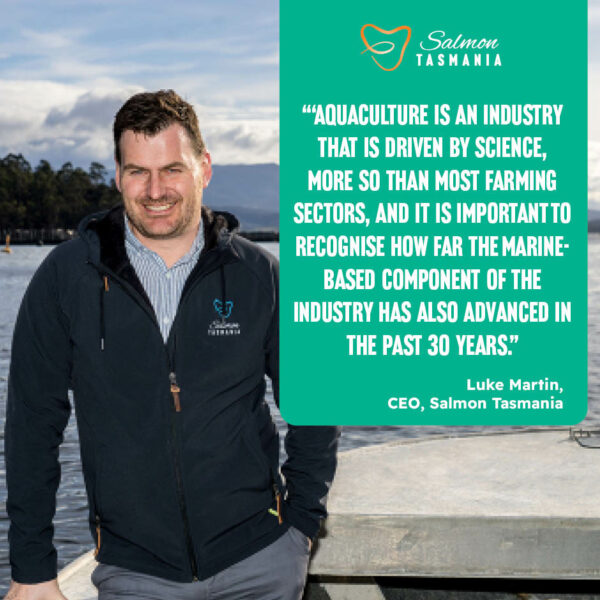 In refreshing contrast to the antagonistic bluster about our industry, from politically motivated activist groups that we often see grace these pages, Rex Beamish’s recent opinion piece (29 December 2023) offers a considered and mature contribution to public debate about the future of salmon aquaculture in Tasmania.
In refreshing contrast to the antagonistic bluster about our industry, from politically motivated activist groups that we often see grace these pages, Rex Beamish’s recent opinion piece (29 December 2023) offers a considered and mature contribution to public debate about the future of salmon aquaculture in Tasmania.
Importantly, Mr Beamish recognises the future for salmon farming is strong, with technology as the key driver, for an even more sustainable industry. It is an industry that must continue to evolve and grow as part of a global transition towards sustainably sourced and low carbon sea-based protein production.
Aquaculture is an industry that is driven by science, more so than most farming sectors, and it is important to recognise how far the marine-based component of the industry has also advanced in the past 30 years.
Over the past three decades, the Tasmanian salmon industry has undergone a remarkable transformation, evolving from a fledgling start-up sector into a global leader in sustainable aquaculture. The journey of the industry’s growth and development is marked by innovations in technology, stringent environmental stewardship, and a commitment to meeting rising global demands for high-quality seafood.
One of our most significant advancements has been the invention and adoption of cutting-edge aquaculture technologies. The industry has embraced state-of-the-art farming practices, including pen design and monitoring systems. These technological innovations have not only increased production efficiency but also minimised the environmental impact of salmon farming.
One shining example is how the integration of advanced feeding systems and camera technologies has revolutionised the industry, enhancing efficiency, sustainability, and overall productivity.
Advanced feeding systems utilise precision in delivering optimal amounts of feed and ensuring that salmon receive the nutrients they need for growth. This not only improves cost-effectiveness but also minimises any environmental impact associated with excess feed that thankfully, due to significant investment, is an issue of the past.
Underwater, in-net cameras also play a pivotal role in monitoring fish health and behaviour. High-tech underwater cameras enable constant surveillance, allowing farmers to quickly identify any signs of stress, environmental change, or abnormal behaviour. This proactive approach enhances early detection and response, contributing to improved fish welfare and minimising risks to fish health.
Overall, the combination of advanced feeding and camera technologies has elevated the Tasmanian salmon industry by promoting precision farming, sustainability, and the well-being of the aquatic environment.
Striking a balance between meeting consumer demand and preserving the delicate marine ecosystems we operate within is at the very heart of how the industry operates. We operate under some of the strictest regulatory and monitoring protocols for any industry in any jurisdiction in the country. The industry continues to reduce its environmental footprint with strategies that include waste management initiatives, energy usage, carbon reduction, and is investing in alternative feed sources that make use of byproduct from other farming sectors.
Right now, the industry is working with scientists on a major multi-million-dollar oxygenation project in Macquarie Harbour to further offset the impact of our activities in these waterways and help improve the natural environment for the endangered Maugean Skate. I do not believe any other Tasmanian industry could, or would, move as quickly as we have in responding to an undeniable challenge in the environment we operate within.
The industry’s commitment to quality assurance and food safety standards has been instrumental in gaining international recognition and consumer trust. Stringent regulations ensure that Tasmanian salmon meets or exceeds global standards, making it a sought-after product in local and international markets.
Additionally, community engagement and collaboration with environmental organisations have played a pivotal role in fostering positive relationships and addressing marine-based farming concerns. The industry’s proactive approach to addressing environmental challenges and embracing transparency has not only safeguarded its reputation but also positioned Tasmanian salmon as a sustainable and responsible choice in the global seafood market.
The Tasmanian salmon industry’s evolution over the past 30 years reflects a commitment to continual investment, innovation, sustainability, and responsible practices. Through technological advancements, environmental stewardship, and a dedication to quality, the industry has not only flourished but has set a benchmark for sustainable aquaculture worldwide.
Since I started in this role, and being a newcomer to the industry, I would have to say that what never fails to impress me is the amount of investment and how expertise, and experience from all around the world is guiding this industry into the future.
Whilst the future might not be the exact ideas Mr Beamish has proposed, we can expect that the teams of highly qualified scientists, engineers and industry experts are committed to continual innovation and investment, and that the future of Tasmanian salmon farming is bright.
Luke Martin
CEO, Salmon Tasmania
As published – The Mercury Newspaper – 4 Jan 2024.